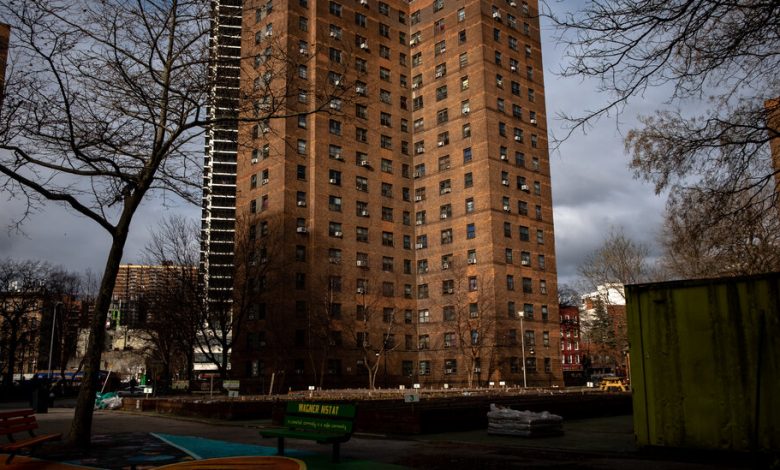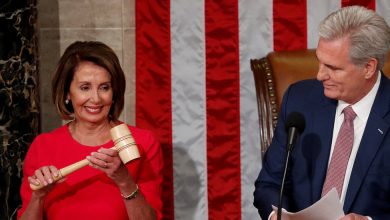As Thousands Fall Behind on Rent, Public Housing Faces ‘Disaster’

It has been years since public housing in New York City has received enough money from the government to deal with the aging buildings, spotty heating systems, malfunctioning elevators, rats and more that have made it an emblem of neglect.
Now, plummeting rent payments from residents threaten to escalate the crisis in the nation’s oldest, largest public housing system.
More than 1,600 public housing agencies nationwide — from those in Richmond, Va., to San Francisco — have faced a “significant decrease” in collections since the onset of the coronavirus pandemic, according to the Department of Housing and Urban Development, as tenants lost work or spent more on cleaning supplies and other safety measures. When evictions were put on hold, people could miss payments without fear of losing their homes. Aid to help cover the mountain of back rent was sometimes confusing to access or left people in public housing out entirely, leaving local agencies to deal with the consequences.
But nowhere has the phenomenon been as dire as in New York. The New York City Housing Authority collected just 65 percent of the rent it charged in the 12 months leading up to December, the lowest percentage in the agency’s nearly 100-year history and an alarming slide from the annual prepandemic numbers of 90 percent or higher.
“It’s really just a recipe for disaster,” Lisa Bova-Hiatt, who took over as CEO of NYCHA on an interim basis in September, said in an interview.
She added, “Without money, we can’t do anything else. We can’t fund the much needed repairs. We can’t handle emergencies.”
The rent problems are a fresh setback for an institution that, despite its many troubles, is vital to New York, providing some of the few truly affordable homes in one of the nation’s most expensive cities. NYCHA’s more than 270 developments are home to some 340,000 people.
But the shortfall, amounting to almost half a billion dollars, threatens to impede the agency’s ability to repair faulty elevators and leaky roofs, run day-to-day operations and do the huge amount of construction work required to address lead, mold and other dismal conditions in thousands of apartments. That may prompt exasperated residents to withhold rent.
The agency is already feeling the toll. This year, it cut dozens of contracts for legal, financial and administrative work and eliminated about 150 vacant positions. NYCHA has also been pulling from its financial reserves, which are so low that they cannot even cover one month’s worth of expenses.
“I am very, very alarmed about the situation NYCHA is in financially,” said Tim Kaiser, the executive director of the Public Housing Authorities Directors Association, a Washington-based group that works on behalf of about 1,900 housing agencies and has raised the alarm with the federal government about the rent issues.
New York’s public housing system was once heralded as a progressive triumph, providing solid, stable homes for working-class people. But dwindling funds, scandal and mismanagement have made it the focus of one of the city’s most urgent crises and a high-profile example of the effects of the federal government’s retreat from housing. NYCHA estimates it needs a staggering $40 billion to return its developments to decent condition.
A monitor, appointed as part of a 2019 agreement with the federal government to push NYCHA to address its problems, delivered a mixed verdict on the agency’s progress. The monitor said, for instance, that 108 elevators needed to be replaced by the end of 2022. NYCHA said it could replace eight.
Mayor Eric Adams is pushing a contentious plan to place the city’s housing developments under private management, in New York’s version of a program developed by the Obama administration to decrease reliance on inconsistent government funding. The city said earlier this month that between 2015 and the end of last year, it had either completed or started renovations on some 36,000 apartments under the plan.
Another plan calls for some developments to be transferred over to a new public benefit corporation, which officials predict could generate more than $5 billion to improve the agency’s housing.
But without adequate rent collection, typically totaling about $1 billion every year before the pandemic, NYCHA may not be able to cover salaries, upfront construction costs and other day-to-day operations needed to carry out the more ambitious solutions.
Making matters worse, NYCHA’s costs appear to be ballooning. The agency spent about $267 million in 2019 to meet the provisions of the agreement with the federal government, according to Annika Lescott-Martinez, NYCHA’s chief financial officer. Last year, it spent $392 million, as its obligations under the agreement ramped up.
“We’re receiving less revenue, but spending more at the very same time,” she said.
According to the Citizens Budget Commission, a nonprofit fiscal watchdog, NYCHA’s operating costs per unit have grown about 50 percent since 2013 and exceed those of other types of affordable housing. The federal agreement and the increasing costs of benefits and overtime are the major reasons for the increase, said Sean Campion, the commission’s director of housing and economic development studies.
Rent is generally capped at 30 percent of a resident’s income and adjusted if a household’s income goes up or down. From 2019 through 2021, the agency received more than 500,000 requests for rent adjustments.
Even with many adjustments made, the total sum of rent owed has continued to increase.
“Some folks got misinformed that they didn’t have to pay; there would be emergency funding available and they wouldn’t have to pay,” Mr. Kaiser said. “I think in other instances, the eviction moratorium kind of served as a protection in the minds of some, that they would not be evicted, and therefore they would not pay their rent.”
One of the main problems lies in how New York legislators designed the state’s now-depleted pandemic rent relief program. Public housing tenants were given the lowest priority of those eligible for assistance because legislators figured they had access to other safety nets.
NYCHA residents still applied for at least $130 million worth of aid — but they received none. Leaders in the State Legislature and Gov. Kathy Hochul have not made any commitments to provide more funds, and a replenishment of the federal pot is unlikely now that Republicans, who have frequently criticized NYCHA, control the House of Representatives.
That means for tens of thousands of NYCHA residents who are already dealing with the effects of deteriorating buildings, owed back rent is now a new source of constant anxiety.
Stacey Rollins, 56, has lived in the Robert F. Wagner Houses in East Harlem her whole life. But during the pandemic, Ms. Rollins, who works overnight shifts for NYCHA taking calls from residents about emergencies, struggled to cover rent while also paying for her daughter’s college tuition. She eventually amassed a debt of roughly $15,000 for about 12 months of missed payments. It was her first time owing back rent, she said.
Ms. Rollins still owes about $9,000. She applied for rent relief in early 2021, but was told there would be no money coming.
“I know there’s no help out there,” she said. “I’m going to just concentrate on having tunnel vision right now, just trying to make it up.”
Luis Henriquez Carrero, the litigation director at Manhattan Legal Services, a nonprofit that represents tenants in court, said some residents were finding it difficult to figure out how much rent they owed and whether some of it could be abated for repair issues or covered by city aid programs.
In the past, he said, those disputes would often have been litigated in housing court, but NYCHA largely stopped suing tenants for unpaid rent in 2022 and reformed how it approaches evictions.
Agency officials said it was unlikely that filing court cases would have made a huge dent in addressing unpaid rent. They said they were working on better ways to connect residents to aid programs.
In some cases, there are disputes about how much rent is actually owed. Last year, NYCHA paid $190,000 as part of a settlement with a group of residents who accused the agency of miscalculating rents.
Jenice Zayas, who lives in the Lehman Village Houses in East Harlem, said she recently received a bill saying she owed $13,000. But Ms. Zayas, 49, said the bill did not reflect a nearly $7,000 rent abatement she was promised after she sued NYCHA in housing court to try to get repairs done in her apartment.
NYCHA, however, said that it had already applied rent abatements and credits totaling almost $9,500, and that there were no other abatements that had been agreed to. The agency said that it had been prevented from entering the apartment to make repairs.
When combined with the routine elevator outages, leaks and hot-water problems, Ms. Zayas, who is unemployed but studying to become a yoga instructor, said the rent situation was another blow. Ms. Zayas, who lives with her 17-year-old son, has also applied for rent relief.
“At this point, it’s beyond just mental health,” she said. “It’s just overall quality of life.”





